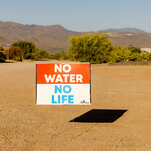RIO VERDE FOOTHILLS, Ariz. When interviewing people in their homes here, I didn’t have the heart to ask them if I could use the bathroom. There’s no water to spare, so some families flush only once a day.
As for showers, they’re rationed and timed: “You get in, you soap up, you turn the water off, and then when you’re done, you turn the water on and wash it off, and then you’re out,” said Cody Reim, who works in construction. All this is because water has become scarce here this year, after the city of Scottsdale from water it had supplied; it said it needed to conserve water for its own residents. The resulting crisis in these foothills outside Phoenix offers a glimpse of what more Americans may face unless we reconfigure how we manage water.
This is a crisis across the West, for the West was built on cheap water that is now running out from underpricing and overuse just as climate change is amplifying droughts. Arizona lures retirees with lush golf courses, sometimes requiring as much as of water per 18-hole golf course over a year. But the big user of water isn’t households, sprawling lawns, fountains, industry or golf courses.
It’s farming. found that 88 percent of water in 17 Western states was used by agriculture. Only 7 percent was consumed by homes.
Alfalfa fields single-handedly drank up almost three times as much as all households. California produces a bounty of almonds, which gulp about 3. 2 gallons of water for each almond, according to a .
Researchers that the Southwest is experiencing a megadrought that is the worst in at least 1,200 years. Wells have been as far north as Oregon, and the Great Salt Lake in Utah has by two-thirds. A wet winter and spring this year have brought a reprieve, but the West is squandering this opportunity to develop a new water regime — because few politicians want to impose painful but necessary cuts on agriculture and other uses.
I came to the Rio Verde Foothills to learn what it’s like to get by when water can no longer be taken for granted. Many homes here got water from underground 5,000-gallon tanks that were filled by trucks from Scottsdale about once a month, for about 4 cents a gallon. (In much of the country, water bills come out to less than a penny a gallon.
) Since Scottsdale cut off the area, water trucks have been hauling water from much farther away, and homeowners are paying 11 cents a gallon; Reim is seeing his water bill soar to a level he hadn’t imagined possible. “Five times my electric bill,” he said. “Almost equal to my mortgage.
” Meanwhile, the — lifeblood of the West, supplier of more than of Arizona’s water, along with substantial quantities for California, Nevada and other states — is running low. The Biden administration has saving what’s left of the river by evenly cutting allotments to California, Arizona and Nevada, by as much as one-quarter. A central problem is that water isn’t allocated by market price but inefficiently through a muddle of irrigation rights that were mostly awarded on a first-come-first-serve basis.
This water is there is little attempt to conserve or develop technical innovations to use less water. Many of the shortages would disappear if water were rationed the way goods normally are in a market economy, by price: Farmers would not irrigate almond orchards if they had to buy 3. 2 gallons of water at market rates to produce each almond.
Mostly we’re a market economy, but water allocation resembles a 1970s Soviet system, with the same lack of price signals and consequently the same inefficiency. Any rationalization of the system and raising of irrigation costs would be wrenching — consider a farm family that has gone into debt to plant a large almond orchard — but there is no other sensible path forward. Outside Scottsdale, Karen Nabity and her husband live in the dream house they built for themselves on an achingly beautiful five-acre plot of desert.
But filling her water tank is now three times as expensive as it was six months ago, and she worries that prices could soar much higher yet. Now there’s a red bucket in the family sink: Any time they wash their hands, they save the water in the bucket and use it to flush the toilet. To clean her hair, she uses dry shampoo, a powder.
She gave up on the idea of a well after a neighbor drilled 1,300 feet and didn’t find water. One of her biggest concerns is a wildfire. It’s not clear to her where the water would come from to fight a fire, and the desert will soon be dry as tinder.
Water is like the air: We take it for granted, until it’s not there. And if we don’t make hard decisions across the West to allocate water more rationally, nature won’t hesitate to make them for us. .
From: nytimes
URL: https://www.nytimes.com/2023/05/13/opinion/water-shortage-west.html



